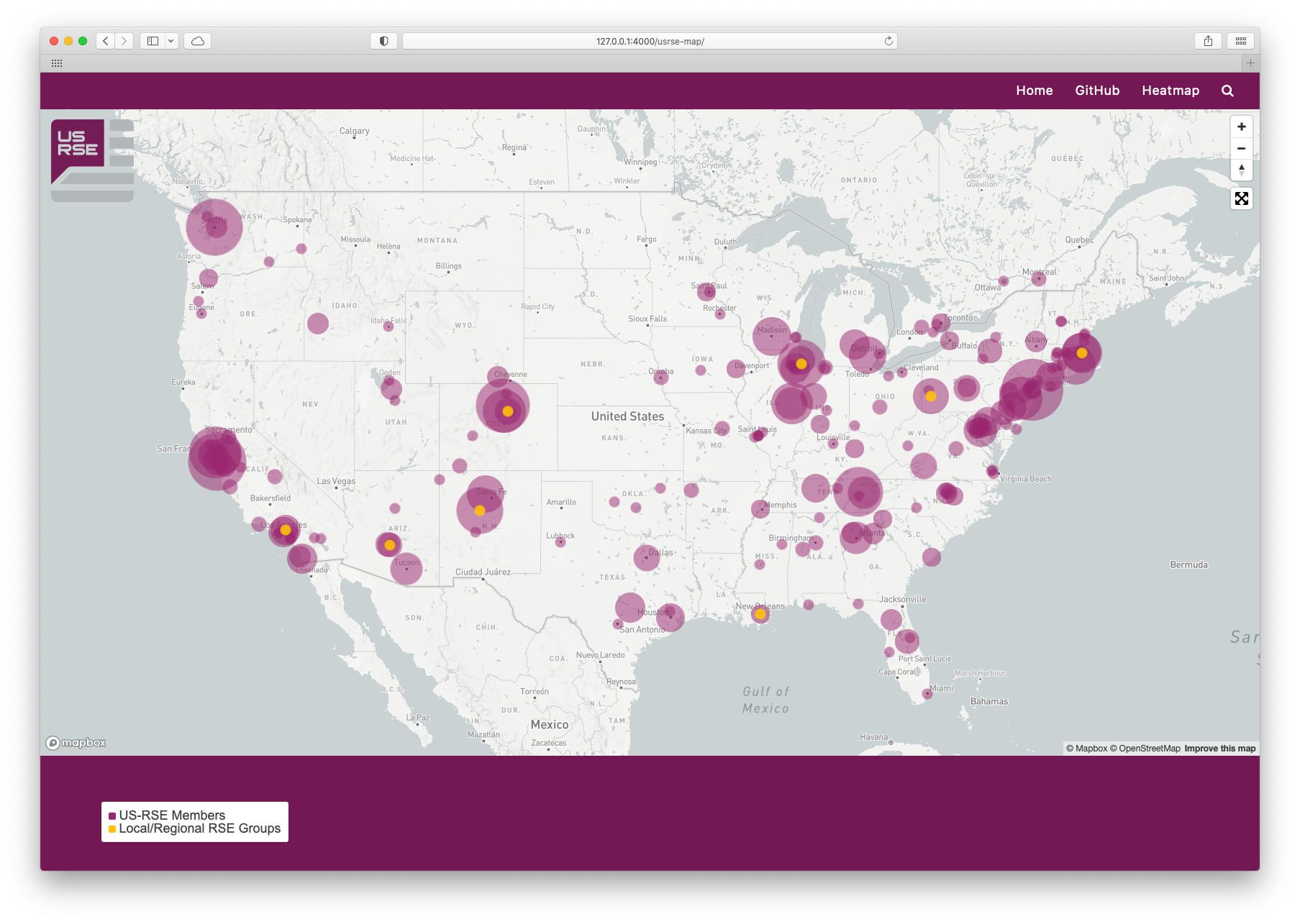Announcing the US-RSE Local and Regional Working Group
Published: Aug 4, 2022
The US-RSE Association has grown to become a major resource for RSEs and people in RSE-like roles. A primary area of support is in organizing meetings including monthly community calls and working groups. Because of the distributed nature of the research software engineering community across the United States, exaggerated by the COVID-19 pandemic and the shift to remote work, most US-RSE activities now take place online. However, co-location and face-to-face meetings have certain advantages for local community building and fostering social connections.
During the 2022 US-RSE Community Building Workshop, a working group was established to identify pathways for creating a network of RSE groups based on geographic areas rather than institutions or companies. The working group aims to inspire the establishment of a network of local and regional RSE groups by creating the support structures that enable organizing and leading such groups. The objective is to connect research software engineers within their local communities in ways that aren’t possible through virtual interactions.
The Local and Regional Working Group consists of the following members:
| Name | Organization |
|---|---|
| Abbey Roelofs | University of Michigan |
| Jordan Perr-Sauer | National Renewable Energy Lab |
| Mahmood Shad | Harvard University |
| Rafael Mudafort | National Renewable Energy Lab |
| Sandra Gesing | University of Illinois - Chicago |
A few members of the working group are conducting an ongoing experiment in establishing local RSE groups in our own areas while also sharing resources, successes and failures. If you are interested in creating a local or regional RSE group or you have already done so and would like to share your experiences with the US-RSE community, please reach out through the US-RSE Slack!
Why start a local group? Why would anyone participate?
In a recent informal poll of the members of the Front Range Slack channel, the following reasons were identified:
- Get to know other RSEs in my area.
- Build my network and make connections.
- Venue for recruiting.
- Learn how to build RSE community at my own institution.
- Opportunities for collaboration, co-working, or a hackerspace.
- Skill and knowledge sharing.
These reasons show one theme in common: RSEs desire to be more connected with a professional community. The need comes from the reality that RSEs are often isolated in their organization. A local group can provide an outlet for sharing technical knowledge and resources while bringing people together from those cities and surrounding cities and affiliations. For example, it can be helpful to learn about how other people use a particular tool like an IDE or which processes are particularly useful at another institution. Even when an organization does have a healthy network of RSEs, socializing with co-workers can have particular limitations. A local RSE group can provide an opportunity to socialize with other people that have a shared experience without the “co-worker” label. A local RSE group is a great way to stay connected to who is doing what in the area. It’s an opportunity to create a local community of RSEs who support each other throughout their careers.
Resources
The US-RSE Association is well-established and has many resources to help in advertising and coordinating local RSE groups. Since the US-RSE Community Building Workshop, the Local and Regional Working Group has met regularly and identified the following activities that enable establishing and leading a local group:
Formation of the Local and Regional Working Group
The working group has been formed and is using the private Slack channel
#wg-local-regional for organization. The working group meets monthly.
If you are interested in joining the working group, reach out to the authors
of this post via Slack.
Support for local groups by the members of the working group
Some members of the working group will experiment by forming a local group in their own community. Since this is a new step for US-RSE, we intend to experiment ourselves and share our experience in a future post. Additionally, we will engage with anyone starting their own local group to offer resources and guidance as well as understand their own unique experience.
Regional group listings
The general US-RSE Slack can be used to host a local-group Slack
channel. By convention, these all are prefixed with #rg- followed by
the name of the location; for example, #rg-nola for the New
Orleans regional group. The following local and regional groups already
exist in Slack. The membership counts are accurate as of the
publication date of this post.
| Location | Slack Channel | Membership |
|---|---|---|
| Arizona | #arizona-rse |
17 |
| California | #california-rse |
38 |
| Chicago Area, Illinois | #rg-chicago-rse |
8 |
| Denver Area, Colorado (Front Range) | #rg-frontrange |
29 |
| New England | #rg-new-england |
13 |
| New Mexico | #new-mexico-rse |
9 |
| New Orleans, LA (NOLA) | #rg-nola |
3 |
| Pennsylvania | #pennsylvania-rse |
7 |
Additionally, a layer has been added to the membership map showing the location of the active local groups. Each dot has an overlay that links to the corresponding Slack channel. This allows visitors to the map to quickly see if a local group exists in their area and communicate via Slack. New groups can be added by engaging directly with this working group.
